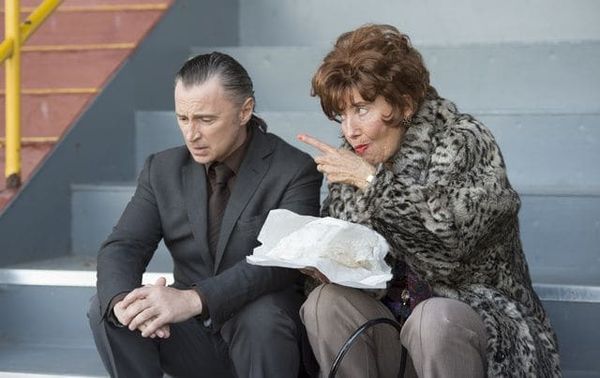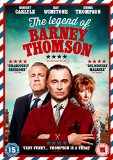Eye For Film >> Movies >> The Legend Of Barney Thomson (2015) Film Review

There's something inherently cinematic about the snip snip of the barber's scissors, or the smooth glide of the open razor. The barbershop is a place of communal gathering, of gossip and masculine bravado. In a Western it, along with the saloon, is the venue in which the local wanna-be gunslingers hear that Ringo is in town. Their eyes glint across the sharpened steel at the chance to become a hero.
Yet, as Robert Carlyle in the Legend Of Barney Thomson muses, the barber himself never gets to be the hero. He isn't the quiet, determined cowboy who rides in to town to save the day. No. He is stuck in the same place, in perpetual motion but never actually getting anywhere, having to look at himself in the mirror all day long. He has to make chit-chat about the weather and the boxing, which for a misanthrope with no interest in sport must be hellish.

Robert Carlyle's directorial debut adapts Douglas Lindsay's novel detailing the life and crimes of the aforementioned Barney Thomson with real panache and wit. The end result places the film in the pantheon of murder-infused barber pictures somewhere between the camp gore of Tim Burton's Sweeney Todd and the existential angst of the Coen Brothers' The Man Who Wasn't There.
Barney Thomson really is a miserable sort. He mopes about the barber's shop in Glasgow with all the charisma and charm of a toenail clipping. None of the regular punters want him to cut their hair - they'd rather wait for Wullie (Stephen McCole) or Chris (Martin Compston). Wullie, whose old man owns the barbers, demotes Barney to the back of the shop, somewhere quiet and out of the way. This small personal humiliation - we're given the impression this is one of many that have defined Barney's existence - sets off a chain of calamitous murders that find poor old Barney on a collision course with Detective Holdall (Ray Winstone).
Barney couldn't be further from Carlyle's most famous incarnation, Begbie, the psychopath from Trainspotting. A bumbling nervous wreck, Thomson finds even the most mundane task - walking through beaded curtains, or returning a comb to his top pocket - challenging and infuriating. Therefore the film's tension, and chunks of its comedy, come from throwing this warbling jelly of a human being into the unlikely role of serial killer.
Glasgow is the backdrop for Barney's torment, and a fitting backdrop it is too. Gallows humour and cold dead bodies - Glasgow was once the 'murder capital of Europe', mind - suit the city well, and Carlyle clearly relishes all the little details that make up his hometown. The film manages to make an evening at the bingo in the Barrowlands a neon, noirish nightmare in no small part aided by the wonderful Emma Thompson as Barney’s maw Cemolina. Thompson is on terrific scene-stealing, scenery-chewing form, her Glaswegian accent revived from Tutti Frutti all those years ago.
She’s an overbearing matriarchal figure from the Livia Soprano school of motherhood, forever undermining and emasculating her son, though with considerably more indecent language. There are strong supporting turns too from Martin Compston and Stephen McCole as Barney’s wise cracking colleagues; Ray Winston plays the Cockney fish out of water with appropriate levels of rage and Ashley Jensen, though given less to do, also provides a comic turn as his boss DI Robertson.
As the number of improbable deaths mount up the film certainly stretches credibility, which perhaps becomes an issue towards the end as the net closes in on the hapless Barney. But on the whole Robert Carlyle’s debut picture manages to keep the gags coming fast enough to distract from the silliness, and it also demonstrates an impressively keen eye for stylish visual elegance, which makes a second outing behind the camera something to look forward to.
Reviewed on: 17 Jun 2015

















